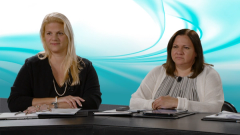
Closing Remarks on the Future of Treating HER2+ Metastatic Breast Cancer
Thought leaders in breast oncology share closing remarks about the future management of HER2+ BC with brain metastases with key insights on unmet needs and evolving treatment approaches.
Episodes in this series

Erika Hamilton, MD: Tiffany, where do you think we’re going? What do you think we need to do in terms of new therapies for HER2 [human epidermal growth factor receptor 2] and leptomeningeal disease? What are our needs?
Tiffany Traina, MD: I think Rita nicely described some of the combination strategies of taking our amazing drugs that we’re seeing in metastatic breast cancer, combining them, then potentially moving those up earlier. Can these agents in the residual disease setting replace [trastuzumab emtansine]? Can we cure more women and patients with HER2-positive breast cancer [with] these combination strategies by moving them up sooner? As I said before, understanding the mechanisms of resistance will guide our sequencing strategies moving forward.
Erika Hamilton, MD: Rita, what [do] you think we need to do moving forward?
Rita Nanda, MD: I’m really excited about all the antibody-drug conjugates in development. We certainly need to understand the mechanisms of resistance to these agents, [as well as] how to sequence all these amazing therapies we’ve got in the most strategic way so we can help women live longer and better [to] avoid brain metastases. We’re doing such a great job controlling visceral disease that brain metastases still become an issue. But again, to see 2 amazing regimens associated with intracranial response is exciting.
Erika Hamilton, MD: I completely agree with you. Sequencing is a big one. The more agents we get, that becomes a little trickier and a little more important. What do you think the biggest remaining question is from the radiation-oncologist world that needs to be answered?
Ryan Jones, MD: I’ve found this concept of pathologic complete response [pCR] interesting. When does that allow you to skip radiation after surgery? You see limited published data, mostly retrospective, on breast-conserving surgery setting and [patients with] pCR and not providing you much comfort that you can skip the adjuvant radiation with local recurrence rates. Then we’ve got things like patients [with] clinically node-positive [disease], for example, we’re still waiting on NSAPB51. By the time we get the results, [you all] have created so many better drugs and moved them up the line that we’re going to have to ask that question again because the drugs improve. It may make our local regional treatment in a nonmetastatic presentation, particularly the nodal radiation, less beneficial. That will shift with time. It’s always adapting to the newer drugs over radionecrosis risk. What can we do on our side in our treatment planning? I’ve come on board with the style of fractionated radiosurgery, not to force the hand of the audience. It’s debatable, but for lesions that get larger in size, we can just fractionate a little on radiosurgery and reduce the radionecrosis risk. How do we sort of play well together, offering these patients the most benefit possible?
Erika Hamilton, MD: Absolutely. Thanks to Ryan, Rita, [and] Tiffany for joining us in this discussion on the treatment of patients with metastatic HER2-positive breast cancer and brain metastases brought to you by the Cancer Network®. Thank you to our viewing audience. We hope you found this interactive discussion to be informative and beneficial to the treatment of your patients with HER2-positive metastatic breast cancer.
Transcript has been edited for clarity.
Newsletter
Stay up to date on recent advances in the multidisciplinary approach to cancer.





































